#prince alexander of serbia
Explore tagged Tumblr posts
Text

As is generally the case, the descent into unhappiness was gradual. When Natalie realized that Milan was beginning to neglect her she would hardly believe it, but she tried to get what consolation she could by devoting herself to her son, who had been born in 1876, a year after their marriage. Her husband was also particularly fond of the child, and the queen – as she was now – hoped that he would be a bond between them. She congratulated herself that Milan had not been attracted by another woman, for she had had careful inquiries made, and the only person Milan had been seen with was a middle-aged, ugly woman known as Madame Christich. Natalie laughed at the idea of Milan, who could not bear ugliness, falling in love with such a woman, and she continued to hope for the best.
She went on living in her fool's paradise until the day she expressed a wish to her lady-in-waiting to visit Topchider, a place which had been deserted since the murder of Prince Michael in 1868. Legends had grown up around the house and whispered that the ghost of Prince Michael walked the grounds on certain afternoons. Natalie asked Milan to take her there. He refused with so much vehemence that her curiosity became intensified. When he positively forbade her to go near Topchider she secretly resolved to pay a visit unknown to him
For a week or two she did not mention Topchider, but when Milan announced that he was going to spend a couple of days away from Belgrade on important State business, Natalie decided that such a chance to gratify her curiosity would never occur again. She took the lady-in-waiting to whom she had first mentioned the subject into her confidence, and, have curtly rejected her advice to stay at home, ordered a closed carriage with the anxious companion beside her set out for Topchider woods.
The carriage reached the estate and dorve in through its gateway and down the drive lined by ancient tress. There was a general air of neglect about the place that gave it a pathetic appearance. Natalie, half-expecting to see the ghost of Prince Michael, stared out of the carriage window, and when she suddenly caught a glimpse not of the ghost, but of her husband, it was a cry of joy which caused Milan to start, wheel around, and face her.
Then Natalie knew that he had been standing under a tree with his arms around a woman and that woman was Madame Christich. With fury in her heart, the jealous queen confronted her husband, and there was a terrible scene while Madame Christich stood in the background with a sneer on her ugly face.
Milan would have assaulted his wife had not the coachman been there to protect her, and when husband met again in the palace at Belgrade that night there was another furious quarrel.
Did Queen Natalie recall the old woman's prediction as she lay awake all night weeping bitterly? I think she did. She was an unhappy queen now and for all time, and exile was only a question of time.
Her first impulse was to leave Serbia, but for the sake of her son she remained. Milan however, did not trouble to maintain any pretense of affection or respect for her. Madame Christich was his idol. It was common knowledge in Belgrade that he called on her every day, and the Serbians used to line up in the streets to see the king drive in an open carriage with parcels by his side. They knew that latter were costly presents for the woman who had hypnotized him.
Quarrels at the palace were daily occurrences now, and little Prince Alexander had the most unhappy time. He would stand in terror and see his mother denounce his father and the latter strike her in his fury. No wonder the boy's character was affected. Anyone who knows the story of his early life and how he was educated can scarcely wonder at the events that led up to the catastrophe of 1903, when he was murdered with his wife.
However Natalie, still very beautiful and young, suppressed her natural inclinations to fly from the man who had ruined her life, and she did all she could for her son. It was easy to pretned her boy made up for the loss of her husband's love, and there was certainly a lot of consolation in the fact that she was the most popular person in the country. The crowds cheered her when she drove out, and in her darkest hours she received scores of offers of help from chivalrous officers and students.
But the state of affairs could not continue for very long, and the climax came on Easter Sunday, 1888. It is the Serbian custom for the king and queen to go to the cathedral, attended by all the principal personages in the capital. At the conclusion of the service the king says “Christ is risen” to each gentleman, who answers, “He is risen indeed,” and is then kissed by his majesty. A similar ceremony takes place between the queen and the ladies.
On this occasion the custom was observed as usual, and Queen Natalie, only twenty-nine, and still remarkably beautiful, was easily the most attractive figure in the cathedral. She received her friends, exchanged salutations, and kissed them in turn, but when about a dozen had passed her presence she say to her extreme horror and indignation that Madame Christich was approaching her with an evil grin of triumph on her face. The woman had declared she would make Queen Natalie kiss her in public, and now under the eyes of the king she was going to justify her boast.
The queen drew back with a look of disdain, and there was a very embarrassing pause. Then Madame Christich turned slowly and fixed her magnetic eyes upon Milan. He took a step forward, and in a curt voice, which was heard by every member of the congregation said, “I command you to kiss Madame Christich.”
The queen remained rigid. The blood mounted in Milan's cheeks. All the time the eyes of the woman were upon him. He clenched his fists for a moment, and then sprang at his wife, trying to clutch her by the throat.
It was lucky for the queen that there were men present, who saved her from her husband that morning, for Milan would have undoubtedly strangled her there and then. But the dragged him from her, and Natalie's friends saw her safely to her carriage. The queen bowed her thanks. Words were beyond her.
I was now, of course, impossible for her to remain in Belgrade, and she immediately started for Wiesbaden, taking her son with her. She did not mind exile provided she had her child. But Milan did not intend that she should have that small modicum of happiness, and he appealed to the Kaiser, who had just ascended the throne, to return Prince Alexander to him. Wilhelm II, a brute and a coward in those days, as he is now, remembered that Queen Natalie was a Russian. He did not like Milan, indeed, he openly despised him, but here was a chance to hurt a Russian lady and add another sorrow to a mother already overburdened with misery. He therefore sent half a dozen police to take Prince Alexander from Natalie and convey him to the representatives of King Milan.
They obeyed instructions, and mother and son were separated, and the police we may be sure, did not forget to insult the queen and mother in characteristic German fashion.
0 notes
Text
#NEW Crown Prince Alexander and Crown Princess Katherine of Serbia as well as Grand Duchess Maria Vladimirovna of Russia have arrived at the Great Britain Hotel in Athens ahead of King Constantine Funeral tomorrow 🇬🇷

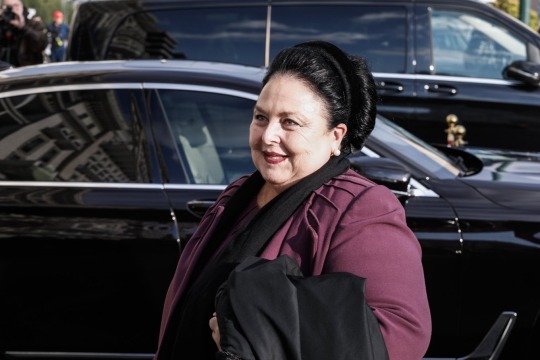
#royal#royalty#royal family#crown Prince Alexander#crown Princess Katherine#Serbia#Grand Duchess Maria Vladimirovna#Russia#Greece
0 notes
Text










After the Prinsjesdag, Queen Máxima and Amalia the Princess of Orange departured to Greece to attend the tribute to Marianna Vardinogiannis. Prominent philanthropist, UNESCO Goodwill Ambassador and very close friend of the Dutch Royal Family.
The tribute was held at Odeon of Herodes Atticus theatre, located at the foot of the Acropolis and also were present members of the Greek Royal Family and Crown Prince Alexander II of Serbia and Yugoslavia and his wife Crown Princess Katherine.
📷 hola.com
17 notes
·
View notes
Text
Foreign Royals at the Coronation of King Charles III
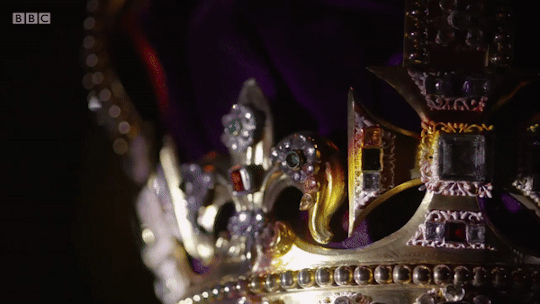
Even though we now know that the coronation on May 6th will not be a tiara event, I'll still keep a running list of foreign royals that have confirmed attendance. Traditionally other monarchs don't attend coronations in the United Kingdom unless they are from a Commonwealth country (Brunei, Eswatini, Lesotho, Malaysia, and Tonga) but they are doing away with that this time around.
Bahrain - King Hamad bin Isa Al Khalifa
Belgium - King Philippe & Queen Mathilde
Bhutan - King Jigme Kesar & Queen Jetsun Pema
Brunei - Sultan Hassanal Bolkiah & Prince 'Abdul Mateen
Cambodia -
Denmark - Crown Prince Frederik & Crown Princess Mary
Eswatini - King Mswati III & Queen Sibonelo LaMbikiza
Japan - Crown Prince Akishino & Crown Princess Kiko
Jordan - King Abdullah II & Queen Rania
Kuwait - Crown Prince Mishal Al Ahmad
Lesotho - King Letsie III & Queen 'Masenate
Liechtenstein - Hereditary Prince Alois & Hereditary Princess Sophie
Luxembourg - Grand Duke Henri & Grand Duchess Maria Teresa
Malaysia - King Abdullah & Queen Azizah
Monaco - Prince Albert & Princess Charlene
Morocco - Princess Lalla Meryem
Netherlands - King Willem Alexander & Queen Máxima
Norway - Crown Prince Haakon & Crown Princess Mette Marit
Oman - Crown Prince Theyazin bin Haitham Al Said
Qatar - Emir Tamim bin Hamad Al Thani
Saudi Arabia - Prince Turki bin Mohammed Al Saud
Spain - King Felipe & Queen Letizia
Sweden - King Carl XVI Gustaf & Crown Princess Victoria
Thailand - King Vajiralongkorn & Queen Suthida
Tonga - King Tupou VI & Queen Nanasipau’u
United Arab Emirates - Sheikh Mansour bin Zayed Al Nahyan
Non-Reigning Royals
Ashanti - King Otumfuo Osei Tutu II & Lady Julia
Baden - Margrave Bernhard & Margravine Stephanie
Bulgaria - King Simeon & Queen Margarita
Greece - Queen Anne Marie & Crown Prince Pavlos (I've seen conflicting reports about Crown Princess Marie Chantal attending.)
Hesse - Landgrave Donatus
Hohenlohe-Langenburg - Prince Philipp & Princess Saskia
Māori - King Tuheitia & Queen Te Atawhai
Romania - Princess Margareta & Prince Radu
Serbia - Crown Prince Alexander & Crown Princess Katherine
157 notes
·
View notes
Text
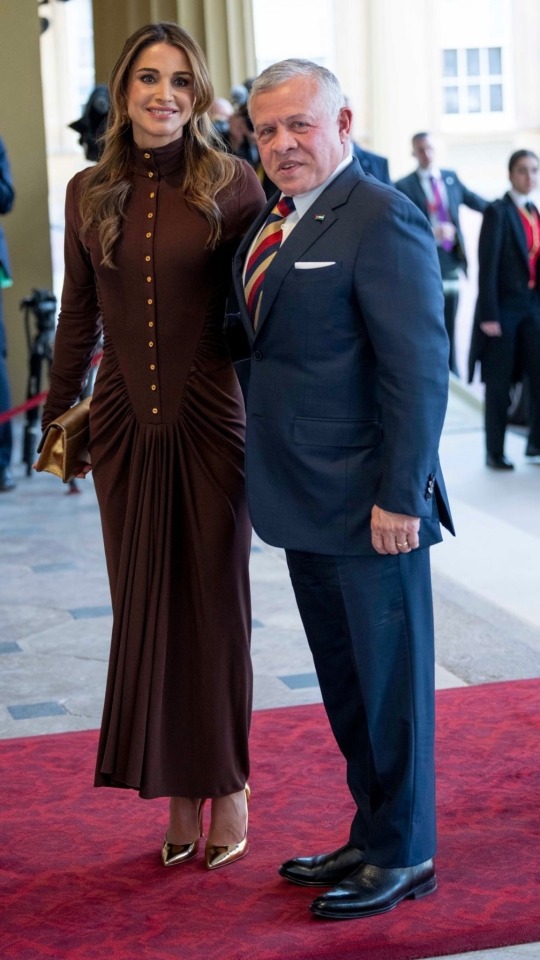
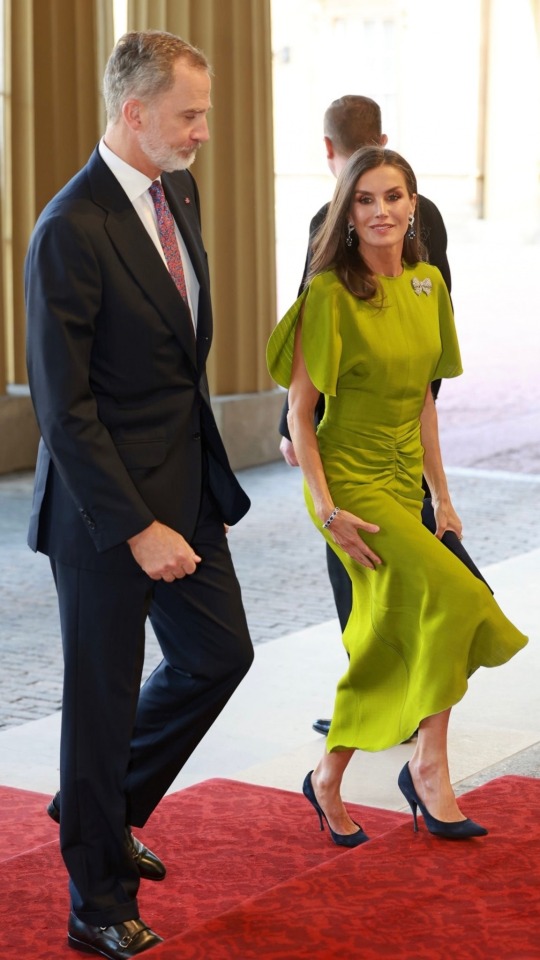

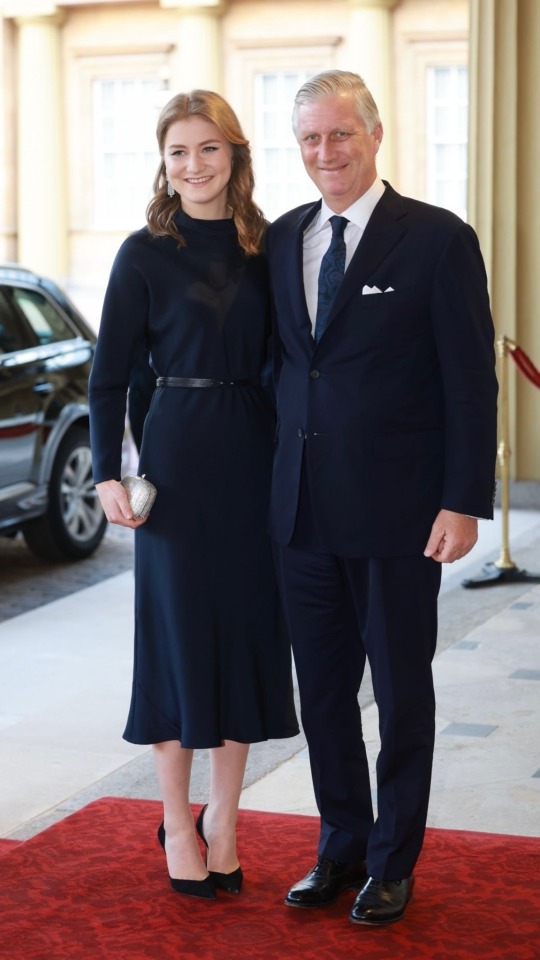

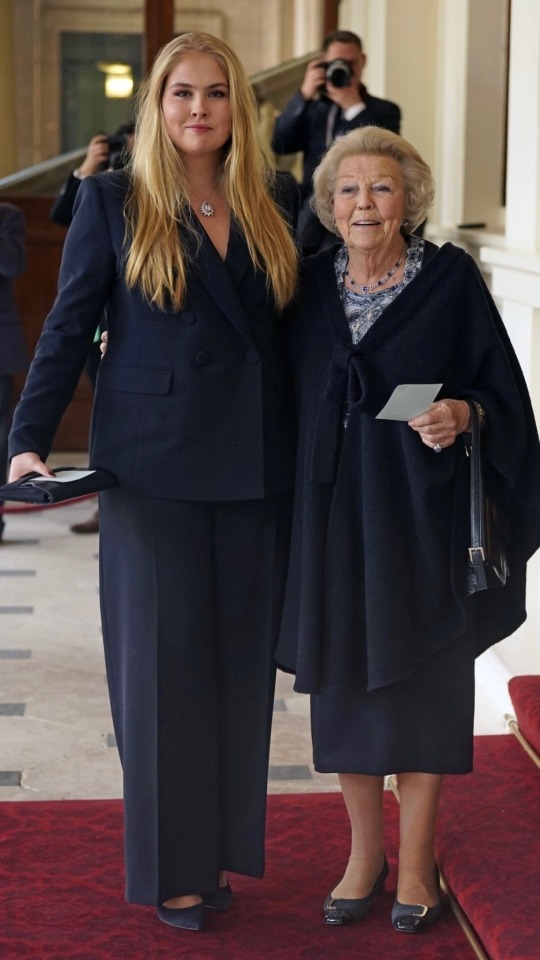

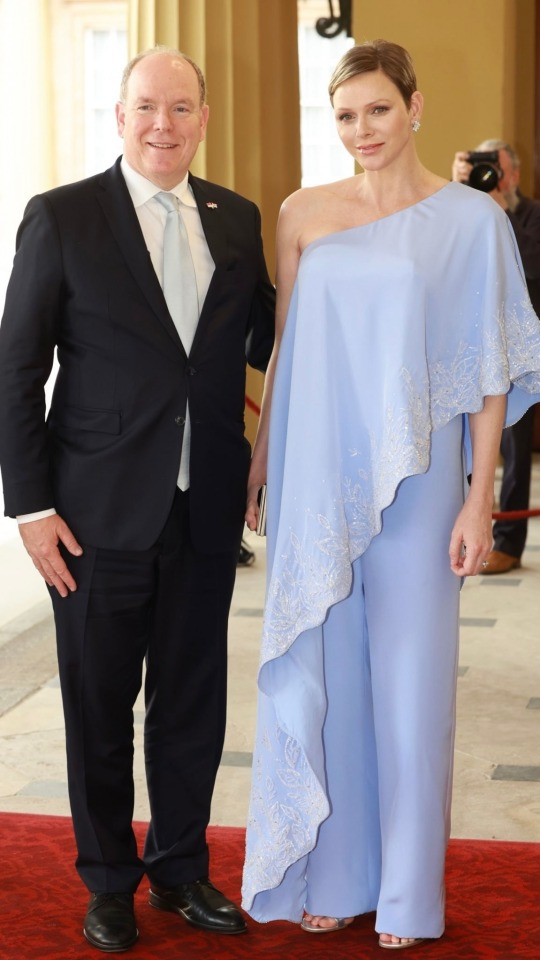
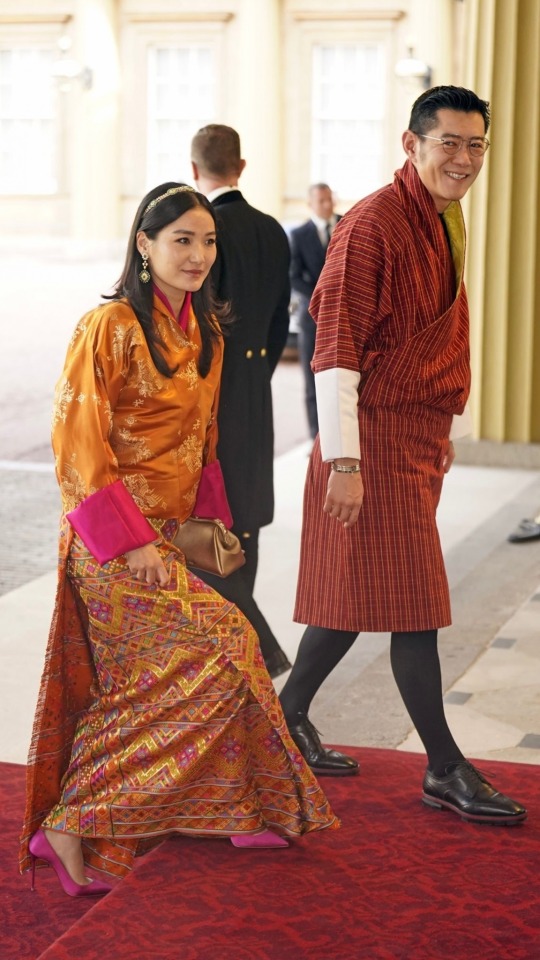
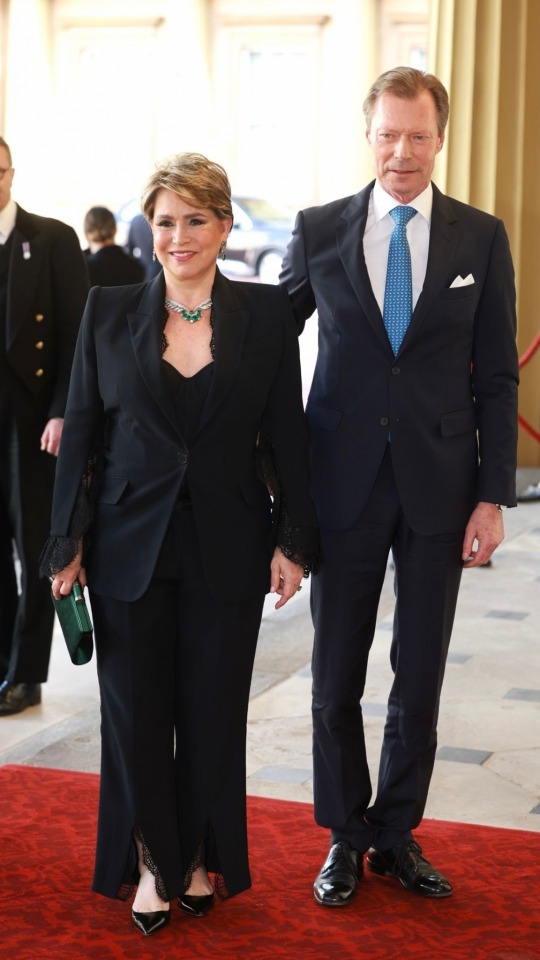

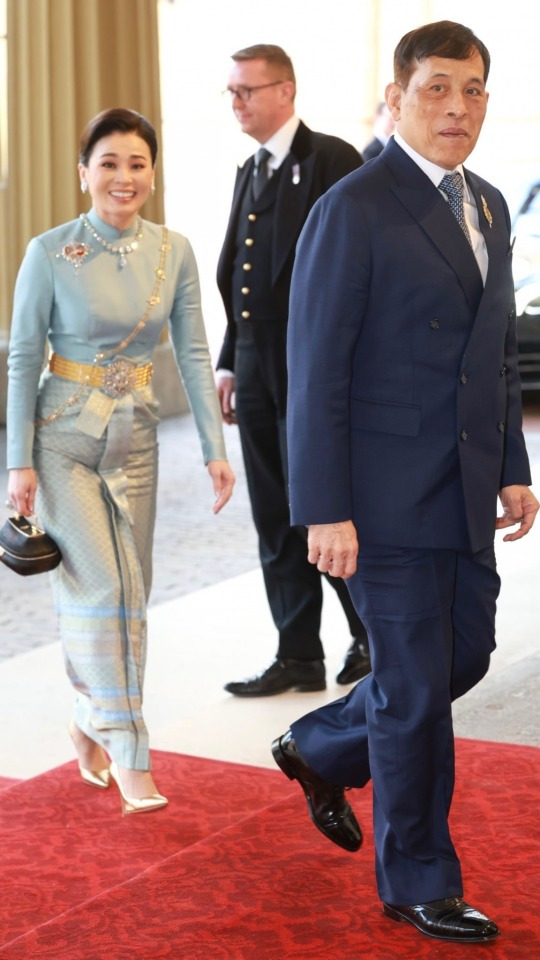

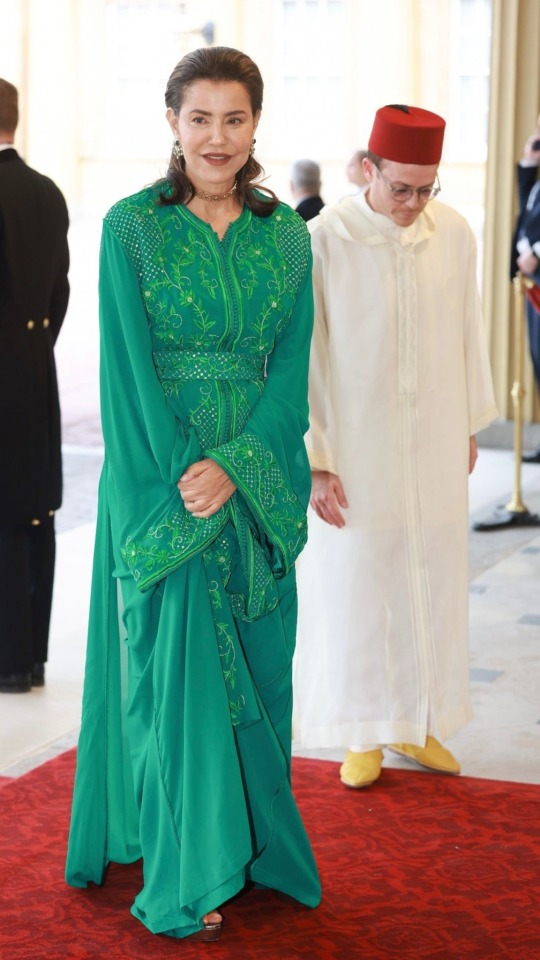

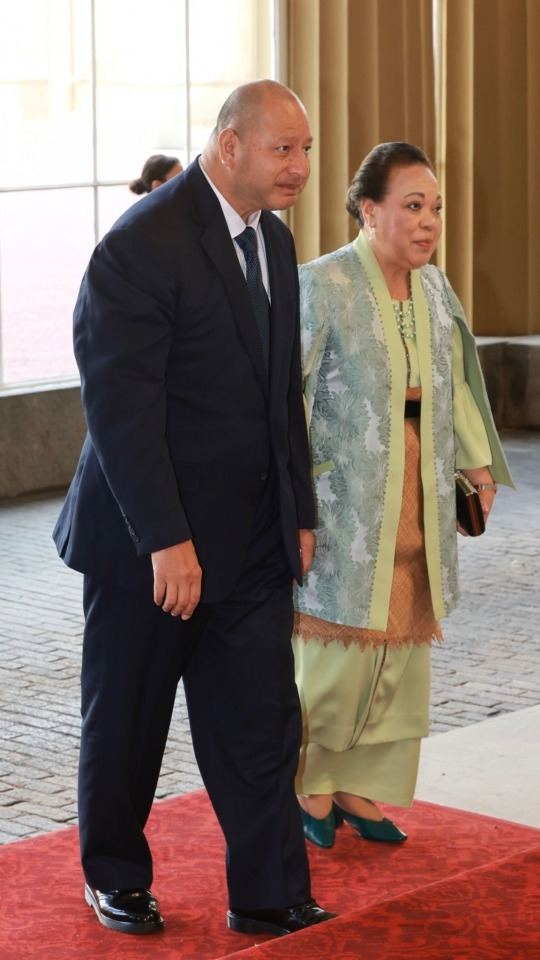
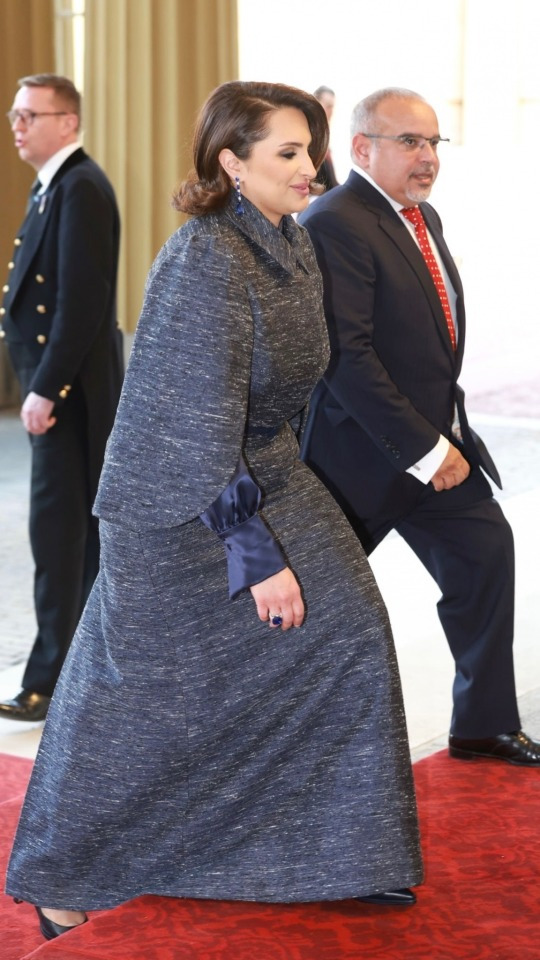

Foreign Royals arrive for the Coronation Reception For Overseas Guests at Buckingham Palace ┃May 5th, 2023
In order:
King Abdullah II and Queen Rania of Jordan
King Felipe V and Queen Letizia of Spain
King Carl VXI Gustaf and Crown Princess Victoria of Sweden
King Philippe and Princess Elisabeth of Belgium
Crown Prince Haakon and Crown Princess Mette-Marit of Norway
Princess Catharina-Amalia and Princess Beatrix of the Netherlands
Crown Prince Frederik and Crown Princess Mary of Denmark
Prince Albert II and Princess Charlene of Monaco
King Jigme Khesar Namgyel Wangchuck and Queen Jetsun Pema of Bhutan
Grand Duke Henri and Grand Duchess Maria-Teresa of Luxembourg
Queen Anne Marie, Crown Prince Pavlos and Crown Princess Marie Chantal of Greece
King Vajiralongkorn and Queen Suthida of Thailand
Crown Prince Alexander and Princess Catherine of Serbia
Princess Lalla Meryem of Morocco
Margareta, Custodian of the Crown of Romania and Prince Radu of Romania
King of Tonga Aho'eitu Unuaki'otonga Tuku'aho Tupou VI and Queen Nanasipau’u of Tonga
Salman bin Hamad Al-Khalifa of Bahrain
Sultan Hassanal Bolkiah and Prince Abdul Mateen of Brunei
#bro i've been writing these names for 5 hours#feel free to correct me idk half of these people lol#kciii coronation
80 notes
·
View notes
Photo





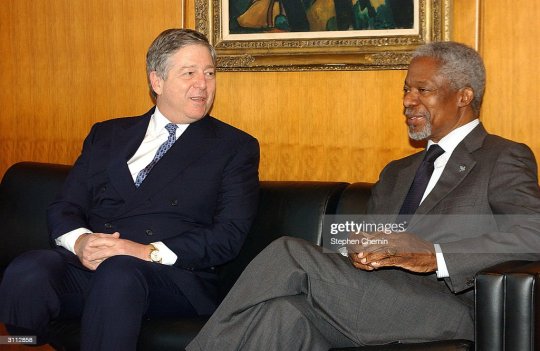
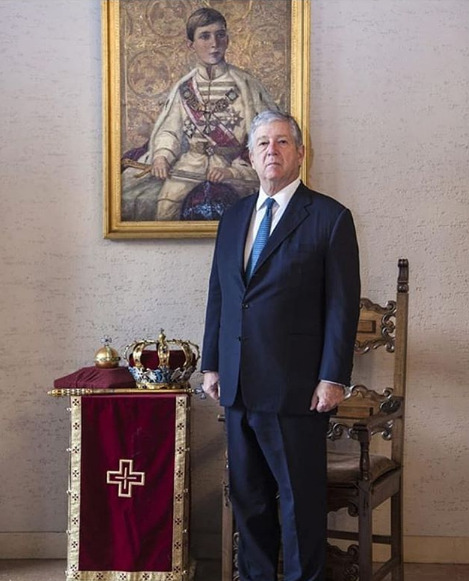


Alexander, Crown Prince of Yugoslavia
Born: July 17, 1945, Claridge's, Mayfair, London Physique: Average Build Height: 6′ 1″
Alexander, Crown Prince of Yugoslavia, is the head of the House of Karađorđević, the former royal house of the defunct Kingdom of Yugoslavia and its predecessor the Kingdom of Serbia. Alexander is the only child of King Peter II and his wife, Princess Alexandra of Greece and Denmark. He held the position of crown prince in the Democratic Federal Yugoslavia for the first four-and-a-half months of his life, until the declaration of the Federal People's Republic of Yugoslavia later in November 1945, when the monarchy was abolished. In public he claims the crowned royal title of "Alexander II Karađorđević" as a pretender to the throne.
The twice married with three sons, Alexander is known for his support of monarchism and his humanitarian work. He's another royal I spotted at His Majesty Charles III's coronation that I now want to do.
86 notes
·
View notes
Text
List of attendees to the service of Thanksgiving to the late King Constantine of Greece on 27th February 2024.
🇬🇧 Queen Camilla
🇬🇧 Princess Anne
🇬🇧 Sir Tim Laurence
🇬🇧 Princess Beatrice
🇬🇧 Edoardo Mapelli Mozzi
🇬🇧 Zara Tindall
🇬🇧 Mike Tindall
🇬🇧 Lady Sarah Chatto
🇬🇧 Daniel Chatto
🇬🇧 Prince Richard, The Duke of Gloucester
🇬🇧 Birgitte, The Duchess of Gloucester
🇬🇧 Prince Edward, The Duke of Kent
🇬🇧 George, The Earl of St. Andrews
🇬🇧 Sylvana, The Countess of St. Andrews
🇬🇧 Lady Helen Taylor
🇬🇧 Prince Michael of Kent
🇬🇧 Princess Michael of Kent
🇬🇧 Princess Alexandra of Kent
🇬🇧 James Ogilvy
🇬🇧 Julia Ogilvy
🇬🇧 Marina Ogilvy
🇬🇧 George, The Marquess of Milford Haven
🇬🇧 Clare, The Marchioness of Milford Haven
🇬🇧 Penny, The Countess Mountbatten of Burma
🇬🇧 Lady Alexandra Hooper
🇬🇧 Thomas Hooper
🇬🇧 India Hicks
🇬🇧 David Flint Wood
🇬🇧 Amory Wood-Hicks
🇬🇧 Prince Andrew, The Duke of York
🇬🇧 Sarah Ferguson
🇬🇷 Queen Anne-Marie
🇬🇷 Crown Prince Pavlos
🇬🇷 Crown Princess Marie-Chantal
🇬🇷 Prince Achileas-Andreas
🇬🇷 Prince Odysseas-Kimon
🇬🇷 Prince Aristides-Stavros
🇬🇷 Princess Maria-Olympia
🇬🇷 Prince Nikolaos
🇬🇷 Princess Tatiana
🇬🇷 Prince Philippos
🇬🇷 Princess Nina
🇬🇷 Princess Theodora
🇬🇷 Matthew Kumar
🇬🇷 Princess Alexia
🇬🇷 Carlos Morales
🇬🇷 Princess Irene
🇪🇸 King Juan Carlos
🇪🇸 Queen Sofia
🇪🇸 King Felipe
🇪🇸 Queen Letizia
🇪🇸 Infanta Elena
🇪🇸 Infanta Cristina
🇪🇸 Juan Urdangarian
🇩🇰 Princess Benedikte
🇩🇰 Prince Gustav
🇩🇰 Princess Carina of Sayn-Wittgenstein-Berleburg
🇩🇰 Princess Alexandra of Sayn-Wittgenstein-Berleburg, Countess Ahlefeldt-Laurvig-Bille
🇩🇰 Count Michael Ahlefeldt-Laurvig-Bille
🇯🇴 Queen Noor of Jordan
🇯🇴 Prince Hassan
🇯🇴 Princess Sarvath of Jordan
🇧🇬 Prince Kyril of Bulgaria
🇷🇸 Crown Prince Alexander of Serbia
🇷🇸 Crown Princess Katherine of Serbia
🇩🇪 Bernhard, Margrave of Baden
🇩🇪 Stephanie, Margravine of Baden
🇩🇪 Landgrave Donatus of Hesse
🇩🇪 Hereditary Prince Ernst August of Hanover
🇩🇪 Princess Saskia of Hohenlohe-Langeburg
Other notable attendees
Nicholas Soames (Conservative politician)
Rocco Forte (British Hotelier)
Hugh Cavendish, Baron Cavendish of Furness (Former member of the House of Lords)
Grania Mary Caulfield (wife of Baron Cavendish of Furness)
John Kerry (United States Special Presidential Envoy for Climate
Lady Susan Hussey (Lady-in-Waiting)
Sir Jackie Stewart (Racecar Driver and good family friend)
Alexandra von Fürstenberg (American Socialite)
Dax Miller (Alexandra von Fürstenbergs husband)
#i did this for the coronation so i thought i’d do this again#there will be more people who attended so if i missed anyone significant plz dm me#king constantine ii thanksgiving service#british royal family#greek royal family#danish royal family#spanish royal family
13 notes
·
View notes
Text

OTMAA Contemporaries: The Italian Royal Family.
From left: Yolanda (1901) with Maria Francesca (1914), Umberto (1904), Mafalda (1902) and Giovanna (1907). Like OTMAA, there were four sisters and only one brother; but in this case, the brother was the middle child. This generation of Italian royalty did have some Romanov connections, as their mother, Queen Elena, was born a princess of Montenegro, and her sisters Militza and Anastasia had married into the Romanov family. Therefor the young Italian royals were first cousins of Roman Petrovich and his sisters Marina and Nadejda. Another aunt, Zorka, had married into the Serbian royal family, and the Italians also counted King Alexander of Serbia/Yugoslavia and his sister, Elena Petrovna, who married Prince Ioann Konstantinovich, among their cousins.
#otmaa contemporaries#italian royal family#yolanda of savoy#mafalda of savoy#umberto ii#giovanna of savoy#maria francesca of savoy#press photo#my collection
21 notes
·
View notes
Text

May 5th, 2023 || Princess Catherine and Prince Alexander of Serbia attend the Coronation Reception for overseas guests at Buckingham Palace.
4 notes
·
View notes
Text
Happy 24th wedding Anniversary to HRH Princess Alexia of Greece and Denmark and Carlos Morales Quintana, who got married in London on this day in 1999! The eldest child of King Constantine and Queen Anne Marie of Greece, Princess Alexia’s wedding was attended by a large royal contingent.
HRH Princess Alexia announcement of the engagement was made at 20-03-1999
On July 7th, there was a grand pre-wedding gala at Bridgewater House in London two days before their Wedding, with many members of her family, including King Constantine and Queen Anne Marie, Crown Prince Pavlos and Crown Princess Marie Chantal, Prince Nikolaos Princess Theodora, Prince Philipos, and Princess Irene, Queen Ingrid, Queen Margrethe, Prince Henrik, and Crown Prince Frederick of Denmark, Queen Sofia, King Juan Carlos, the Prince of Asturias, Infanta Elena, and Infanta Cristina of Spain, and Princess Benedikte of Sayn-Wittgenstein-Berleburg with Prince Gustav, Princess Alexandra, and Princess Nathalie. Other Royal Guests included Queen Beatrix of The Netherlands, Queen Sonja and Crown Prince Haakon of Norway, Crown Prince Alexander and Crown Princess Katherine of Serbia, Prince Kyril and Princess Rosario of Bulgaria, Princess Badiya of Jordan, the Duke and Duchess of Gloucester, and Prince and Princess Michael of Kent among a series of Royal and Noble Guests and Relatives
The Wedding Ceremony was held at the Greek Orthodox .Cathedral of Saint Sophia in London on July.
Princess Alexia wore a Inge Sprawson gown with Princess Margaret of Connaught’s lace veil, the Khedive of Egypt Tiara (which all female descendants of Queen Ingrid wear at their wedding ) and her Diamond Earrings. Carlos Morales Quintana wore Morning Dress.
The Greek Royal Family has links to all the European Royal Houses, and many guests travelled to London to take part in this event. Three Kings and eight Queens were in attendance, including Queen Elizabeth II, who rarely attends foreign royal events, Queen Margrethe, Prince Henrik, and Queen Ingrid of Denmark, King Juan Carlos and Queen Sofia of Spain, King Carl GVI Gustaf and Queen Silvia of Sweden, Queen Noor of Jordan, Queen Sonja of Norway, and Grand Duke Jean and Grand Duchess Josephine Charlotte of Luxembourg.
Χρονια πολλά για την 24η επέτειο γάμου Στην ΑΒΥ Αλεξία της Ελλάδας και της Δανίας και τον Κάρλος Μοράλες Κουιντάνα, που παντρεύτηκαν στο Λονδίνο σαν σήμερα το 1999! Στο γάμο της πριγκίπισσας Αλεξίας, του μεγαλύτερου παιδιού του βασιλιά Κωνσταντίνου και της Βασίλισσας Άννας Μαρίας της Ελλάδας, παραβρέθηκε μεγάλη βασιλική ομάδα.
Η ανακοίνωση του αρραβώνα της ΑΒΥ Πριγκιπισσας Αλεξιας έγινε στις 20-03-1999
Στις 7 Ιουλίου, έγινε ένα μεγαλειώδες προγαμήλιο γκαλά στο Bridgewater House στο Λονδίνο δύο ημέρες πριν από τον γάμο τους, με πολλά μέλη της οικογένειάς της, όπως ο βασιλιάς Κωνσταντίνος και η βασίλισσα Άννα Μαρία, ο διάδοχος του θρόνου Παύλος και η διάδοχος πριγκίπισσα Μαρία Σαντάλ, ο Πρίγκιπας Νικόλαος Πριγκίπισσα Θεοδώρα, ο πρίγκιπας Φίλιππος και η πριγκίπισσα Ειρήνη, η βασίλισσα Ίνγκριντ, η βασίλισσα Μαργαρίτα , ο πρίγκιπας Ερρίκος και ο διάδοχος Φρειδερίκος της Δανίας, η βασίλισσα Σοφία, ο βασιλιάς Χουάν Κάρλος, ο Πρίγκιπας της Αστούριας, η Ινφάντα Έλενα και η Ινφάντα Κριστίνα της Ισπανίας και η Πριγκίπισσα Βενεδίκτη της Ο Sayn-Wittgenstein-Berleburg με τον πρίγκιπα Gustav, την πριγκίπισσα Alexandra και την πριγκίπισσα Nathalie. Άλλοι βασιλικοί προσκεκλημένοι ήταν η βασίλισσα Βεατρίκη της Ολλανδίας, η βασίλισσα Sonja και ο διάδοχος πρίγκιπας Haakon της Νορβηγίας, ο διάδοχος Αλέξανδρος και η διάδοχος πριγκίπισσα Αικατερίνη της Σερβίας, ο πρίγκιπας Κύριλλος και η πριγκίπισσα Ροζάριο της Βουλγαρίας, η πριγκίπισσα Badiya της Ιορδανίας, ο δούκας και η δούκισσα του Gloucester και Ο Πρίγκιπας και η Πριγκίπισσα Μιχαήλ του Κεντ μεταξύ μιας σειράς Βασιλικών και Ευγενών Προσκεκλημένων και Συγγενών
Η Γαμήλια Τελετή πραγματοποιήθηκε στον Ελληνορθόδοξο Καθεδρικό Ναό της Αγίας Σοφίας στο Λονδίνο στις 9 Ιούλιου.
Η πριγκίπισσα Αλεξία φορούσε ένα φόρεμα Inge Sprawson με το δαντελένιο πέπλο της πριγκίπισσας Margaret of Connaught, την Khedive of Egypt Tiara (την οποία φορούν στο γάμο τους ολες οι γυναίκες απόγονοι της Βασίλισσας Ίνγκριντ ) και τα διαμαντένια σκουλαρίκια της. Ο Carlos Morales Quintana φορούσε Πρωινό κουστούμι .
Η Ελληνική Βασιλική Οικογένεια έχει συνδέσμους με όλους τους Ευρωπαϊκούς Βασιλικούς Οίκους και πολλοί καλεσμένοι ταξίδεψαν στο Λονδίνο για να λάβουν μέρος σε αυτή την εκδήλωση. Τρεις βασιλιάδες και οκτώ βασίλισσες ήταν παρόντες, συμπεριλαμβανομένης της βασίλισσας Ελισάβετ Β', η οποία σπάνια παρευρίσκεται σε ξένες βασιλικές εκδηλώσεις, η βασίλισσα Μαργαρίτα , ο πρίγκιπας Ερρίκος και η βασίλισσα Ίνγκριντ της Δανίας, ο βασιλιάς Χουάν Κάρλος και η βασίλισσα Σοφία της Ισπανίας, ο Βασιλιάς Καρλ Γκουστάφ και η Βασίλισσα Σίλβια Σουηδία, η βασίλισσα Noor της Ιορδανίας, η βασίλισσα Sonja της Νορβηγίας και ο μεγάλος δούκας Jean και η μεγάλη δούκισσα Josephine Charlotte του Λουξεμβούργου.
#kingconstantine#danishroyalfamily#crownprincepavlos#queenannemarie#greek royal family#house of romanov#greekroyals#crownprincessmariechantal#danishroyals#princeconstantinealexios
2 notes
·
View notes
Text

“Prince Peter, Prince Philip and Prince Alexander, the three sons of Crown Prince Alexander of Serbia by his first wife, Princess Maria da Glória of Orléans-Bragança.”
From FB
2 notes
·
View notes
Text
Such was the rebirth of modern Bulgaria, the youngest independent state, with the exception of Albania, in the Balkan Peninsula. It was composed, for the greater part, of hardy peasants recently emancipated from the Turkish yoke, when the election that secured Alexander of Battenberg as Prince of Bulgaria took place in 1879. His reign of six years was marked by a great increase of territory to the nation in the acquirement of Eastern Roumelia, and the war with Serbia, in which the Bulgarians showed their mettle as fighters, and their confidence in their self- chosen Prince, seemed to afford some hope of sustained national development. But misfortune dogged the

Gordon, W., Dodd, M. & Company. (1916).A woman in the Balkans. New York: Dodd, Mead & Company.
0 notes
Text
youtube
written by: me soft: fl studio
January the 17th. Friday. Had lessons in the morning. Had breakfast with Papá, aunt Ella, Alexander P of Serbia (Elena's brother, Ioannchik's brother-in-law) and Kostya.
Grand Duchess Tatiana's diary entry, 1913
It was also reported that he intended to make the Grand Duchess Tatiana, the late Czar's eldest daughter, his wife, and from whom the pitiless Red executioners separated him forever. As a result of their attachment he is often referred to as the protector and friend of the Russian refugees.
New York Times on Prince Alexander's alleged engagements
#wildfieldz music#selfmade music#instrumental music#fl studio#the romanovs#serbian royal family#grand duchess tatiana#tatiana nikolaevna#tatiana romanov#alexander karageorgievich#aleksandar karadjordjevic#aleksandar od yugoslavije#historical quotes#tatiana x alexander#the ultimate otp#i said what i said
1 note
·
View note
Note
Hello Professor Reames! How has the Macedonian Question influenced the historiography around Alexander?
The Macedonian Question & Ancient Macedonian Studies
(or, Come study ancient Macedonia! We cause riots!)
I’ll begin by explaining, for those unfamiliar, the “Macedonian Question” centers on who gets to lay claim to the name “Macedonia” and (originally) the geographical region, which is ethnically diverse but majority Slavic. It arose during the First and Second Balkan Wars of 1912-13, then returned after the breakup of Yugoslavia, from 1989 on.
I’ve been a bit chary about replying to this simply because it is (still) a hot topic, if not what it used to be even 10 years ago. Also…expect maps. Let me lead with three points:
1) The ancient Macedonians certainly weren’t Slavic. Slavs didn’t arrive in the area until the 6th century CE (AD), a millennia after Alexander lived. No ancient historian claimed they were Slavs, although some Slavic Nationalists used carefully edited quotes from ancient historians to support their own claims to the ancient Macedonians.
2) A lot of different peoples have passed through the Balkans and northern Greece (and even southern Greece) between now and 2300+ years ago. The Balkans have continued to be an ethnically contested area from antiquity to modernity, and who was “in charge” depended on what century it was.
3) Ancient concepts of Greek ethnicity didn’t ossify until around the Greco-Persian Wars. Prior to that, Greeks were more aware of/concerned with their citizenship/ethnicity in specific city-states (poleis) and/or language family groupings (Ionic-Attic, Doric, Aeolic).
Furthermore, these views were based on MYTH. To be Greek (Hellenic) meant to be descended from the mythical forerunner, Hellen, son of the equally mythical Dukalion (who survived the Flood…e.g., Greek Noah). There were other children of Dukalion, including a daughter Thyia. Thyia became the mother of Makedon, the mythical progenitor of the Macedonians.
So, by ancient criteria, Macedonians weren’t Hellenes (Greek). But they were kissing cousins. The ancients took these things seriously. That’s why I wanted to explain, so when the ancient Greeks said Macedonians weren’t Greeks, it didn’t mean what we’d consider it to mean today.
Back to the Macedonian Question … the issue of the Greekness of the ancient Macedonians got tied up in modern politics when Yugoslavia fell apart. During the First Balkan War and the division of Macedonia in 1913, “Macedonian Studies” didn’t exist yet. By the Third Balkan War (collapse of Yugoslavia), they did. And history was suddenly being pressed into the service of modern political agendas.
Now, let me back up and explain—as briefly as I can (so expect some judicious epitomizing)—the emergence of modern Greece and the First and Second Balkan Wars.
The Ottoman Empire began to collapse (not just decline) in the 1800s, and was essentially kicked out of Europe entirely by the First Balkan War and World War I. The last of it fell apart with the rise of Attaturk and the Young Turk Revolution, so Modern Turkey emerged in 1923.

Greece was part of that. The Greek War of Independence started in 1821, and Greece secured statehood in 1829/30, then became the Kingdom of Greece in 1832/3, which lasted until the military junta abolished it in 1973, after which it became the [Third] Hellenic Republic. From independence until the end of WWII, Greek borders expanded (see map below). Fun detail, the late Prince Philip, Elizabeth II’s husband, was a Greek (and Danish) prince.

The First Balkan War began in 1912, which was the Ottoman’s last gasp in Europe. The Austro-Hungarians wanted to make the Balkans a subject state, Russia wanted more control over the Black Sea, and Greece wanted to push north towards Thessaloniki and “Constantinople” (Istanbul). Ignoring Austro-Hungary, Serbia wanted to reconstitute “Greater Serbia” (14th Century Serbian empire)—which included a good chunk of Greece. And Bulgaria, with the strongest regional army, was eying the whole area south to the sea.

Oh, and let’s add in a dose of religious difference (Muslim vs. Orthodox Christian) just for snorts and giggles.
But this was basically about SEA TRADE access. So, for the three allies against the Ottomans, e.g., Bulgaria, Greece, and Serbia, Thessaloniki, Jewel of the Aegean, was the prize.
The war began October 8th, and by November 8th (1912), the three Balkan allies all hurried their armies to converge on Thessaloniki as the Ottomans withdrew. The Greeks got there mere hours ahead of the Bulgarians.
"Θεσσαλονίκη με κάθε κόστος!" (Thessaloniki, at all costs!) E. Venizelos
The war itself ended the next year (in part thanks to the Greek fleet in Thessaloniki), and Greece kept the city, and with it, still controls a lot of shipping in the Eastern Mediterranean. Shipping remains Greece’s second most profitable industry (after tourism).
Following the war’s conclusion, several issues arose, including how to partition the land—particularly the geographical region of Macedonia. The 1913 Treaty of London split it up between Bulgaria (smallest part), Greece, and Serbia (biggest part). Again, Greece and Serbia wanted to keep Bulgaria, with the most powerful army, from gaining substantially more land.

World War I intervened, and then the rise of Attaturk in Turkey and the “Megali Idea” in Greece. The Megali Idea, proposed at the Paris Peace Conference after WWI (map below), got Greece in trouble. It would have involved retaking not just the islands off Turkey’s coast, but chunks of the Turkish mainland, to match ancient Greek land claims. All THAT led to showdowns, with ongoing human rights abuses on both sides (including the Armenian Genocide earlier, which wasn’t related to Greece).

In 1923, Greece/Hellas and the new Republic of Türkiye agreed to an exchange of populations. So, Ottoman Turks/Muslims in Greece retreated to Turkey (were kicked out), and Greeks in Turkey retreated into Greece (were kicked out). About half those Greek refugees landed in Athens, whose population exploded overnight, creating an economic crisis. Many of the rest ended up in areas of northern Greece, where land from fleeing Muslims was to be had. Ergo, many new immigrants had very strong pro-Hellenic, anti-Muslim/anyone else feeling, and hadn’t been living for ages next to their (Macedonian) Slavic neighbors, who began to feel unwelcome. It also had negative effects on their Jewish neighbors, too. (The loss of Jewish life in WWII in northern Greece, especially Thessaloniki, is both shocking and heartbreaking.)
Keep in mind that the refugees on both sides had been living in their original countries not for a few decades, but for a couple centuries, or even longer in the case of the Greeks in Anatolia/Turkey. The first Greek colonies there date to the 700s/600s… BCE. There’s a good reason the Greeks and Turks hate each other, and it’s not just Cyprus. The atrocities at the beginning of the 20th Century were awful. Neither side has clean hands.
Anyway, there was a second Balkan War in 1913, which I’m ignoring, except for the map below. It amounts to Bulgaria getting pissy about their short shrift in the earlier Macedonian land division.

Then came fallout from World War II, when Greece got the Dodecanese from Italy, et al. But I want to fast forward to the collapse of The Berlin Wall in Eastern Europe, November 9, 1989, and Yugoslavia’s dissolution shortly after. That ushered in the Third Balkan War, or Yugoslav Wars of the 1990s.
Compared to the Bosnian Genocide and other shit going down with Milosevic, the return of the Macedonian Question seems minor. It involved the Yugoslavian province of Macedonia asking to be called “Macedonia” and Greece having a very public, international melt-down.
The entire dust-up confused much of the rest of the world. The number of times I’ve had to explain it to (non-Greek, non-Slavic) people, who just boggled…. I’ve also seen tourists stand in polite perplexity while Greeks went on a hand-waving tear about how Macedonia has been Greek for 4000 years!!! [I’ve got a t-shirt with that on it.] Btw, 4000 years dates before the first Helladic peoples even migrated into the peninsula. Anyway….
Greeks consider the name Macedonia theirs, on historical grounds. They didn’t object to the new country, but wanted it called Skopje, after the capital, or something, anything not “Macedonia.” Meanwhile, the (Slavic) Macedonians were enormously insulted and pointed to the fact they lived in a region called Macedonia, and their ancestors had been living there for centuries, so why couldn’t they call their new country by the name of the region it occupied? Stated fears of actual territorial expansion by either side were largely scare tactics and fringe rhetoric. It really was all about the name. But increasingly, that began to include claims on the ancient Macedonians, or cultural appropriation. The new Macedonian state (FYROM, then) didn’t do itself any favors with their choice of the (ancient) Macedonian sunburst for their flag and naming their airport after Alexander, et al.

That’s how ancient history got sucked into all of this in a way it didn’t the first time.
Now, let me repeat. The ancient Macedonians were not Slavs. The Thracians were not Slavs either, nor the Paionians, nor the Illyrians, nor the Celts north of them. You won’t find the Thracians called “Slavic” in Bulgarian Museums, even while they take very good care of their regional history.
By the 1990s, Macedonian history had emerged as something more than just “Alexander the Great and Philip,” and questions arose about who these people may have been. Were they Greeks like the Thessalians and Epirotes to their south and west? Or were they non-Greeks like the Thracians, Paionians, and Illyrians to their north? This was an academic (not modern political) question, and involved: 1) what did Makedoniste (“to speak in the Macedonian manner”) mean? Was that a dialect or a different language?; and 2) to what degree did ancient Greeks really consider them non-Greeks (e.g., barbarians)? The fact we had so little epigraphy from the area complicated the language question. And ancient Greek politics complicated the second question. Were the angry repudiations by Demosthenes & Friends a real, widely held sentiment…or just ancient Athenian nationalism and anti-Philip propaganda?
This was mostly nerdy stuff that should have remained safely ensconced at dull specialist panels at academic conferences.
Except …. Manolis Andronikos had found the Royal Tombs at Vergina in 1978, and Greece was bursting with pride (as they should have been). Macedonia was back on the map! Tourists still largely stuck to the Greek south, but The Greek Ministry of Culture and Sport saw an opportunity, even back then, to capitalize on tourism, so you can begin to see why it was important for “Macedonia” to remain Greek. Can’t have a country calling itself Macedonia and maybe confusing people about who Alexander and Philip had been, and where they’d lived (and syphoning off possible tourism dollars).
That may sound unduly cynical, but I’m actually with the Greeks on this, even if I’ve always rolled my eyes over the name thing. And, as noted above “Macedonia” was laying active claim to Philip and Alexander as if there was direct continuity between the ancient Macedonians and the modern ones. See below, the giant Alexander statue erected in Skopje (2011), the biggest in the whole city. It’s formal name these days is “Great Warrior,” by agreement with Greece in order to get to call themselves “Northern Macedonia” in NATO. But it’s Alexander.

Like I said, they weren’t doing themselves any favors, although those arguing in their defense liked to point out that Greece had started it, over the name.
Of course the increasingly heated rhetoric around the name, and ownership of Alexander and Philip, enveloped ancient history like the ash cloud from Vesuvius smothered Pompeii and Herculaneum. By the mid-1990s, “middle ground” wasn’t allowed. If one expressed any doubt about the Greekness of the ancient Macedonians, that was heard as, “You’re siding with the Skopjans!” This dispute was still going strong to the point there were riots and protests at the Balkan Studies’ 7th International Symposium on Ancient Macedon in Thessaloniki on October 16, 2002. These protests erupted over the presence of Kate Mortensen, Ernst Badian, and Daniel Ogden, albeit the protests involved different objections for each scholar. Badian, along with Peter Green and Gene Borza (not present), had long been in the crosshairs of the vehement “Macedonia was Greek!” crowd. But poor Kate got targeted because of her paper, “Homosexuality at the Macedonian Court,” and Daniel had the temerity to present about witchcraft at Philip’s court (UnChristian things!). There were some 40 police called in to protect the presenters. You cannot make up this shit.
Btw, by no means were all Greeks, especially not all Greek scholars, hostile to the (largely Anglophone) Macedoniasts who questioned the ethnicity of the ancient Macedonians. Olga Palagia and Gene Borza remained friends and even wrote articles together, but Olga was retired and had a certain freedom from pressure. Manolis Andronikos and Gene also remained friends until Manolis’s death in 1992. But there was an Official Party Line that had to be maintained, or risk losing an academic job or other position in the Ministry. This also got tied into the identity of the occupants of Royal Tombs I and II at Vergina. Greece’s official position is that these are Amyntas III and Philip II, respectively. This is far from a settled matter, however, especially outside Greece.
For more detail from somebody right in the middle of especially the early parts of the quarrel over who’s buried in “Philip’s Tomb” and the ethnicity of the Macedonians, check out Peter Green’s chapter 10, “The Macedonian Connection,” in Classical Bearings.
To return to the question about how it’s affected historiography, other than resulting in hostility towards non-compliant ancient historians (having their work essentially banned in Greece) and the occasional riot at an academic conference (!!), it also resulted in the production of TWO quasi-competing “Companions” to ancient Macedonia at the end of the first decade of the 2000s.
The original proposal (A Companion to Ancient Macedonia, Roisman and Worthington, Wiley-Blackwell, 2010) had meant to include a number of high-profile scholars of both Greek and non-Greek background. But one of those was Loring Danforth (The Macedonian Conflict). When it came out that he was writing the chapter on modern Macedonia, the Greek contributors revolted en masse. (Some were genuinely furious, others had to, to keep their jobs.) Another Companion was put together with Robin Lane Fox at the editorial helm (Brill’s Companion to Ancient Macedon, Brill, 2011), and the Greeks (and a few others) jumped ship. That was a nice break for some younger Macedonian scholars, incidentally, who were then tapped to write chapters for the Roisman/Worthington volume—and very good chapters, I might add. But the end result is one heavily archaeological Companion (Lane Fox) and one heavily historical one (Roisman/Worthington), and which still has Danforth.
Between the arguments of the 1990s and now, however, one important shift has occurred: enough epigraphical data has emerged, and not just later [Hellenistic], to argue the ancient Macedonians did speak a form of Doric Greek. Many/most of us are now a lot more comfortable agreeing that the ancient Macedonians can be called “Greek” without feeling as if we’re selling our academic souls--even if we may still argue that’s not Philip in Royal Tomb II...an identification that some of the younger Greeks also aren’t sold on. And Philip in Tomb II was never the highly charged political issue that the Greekness of the ancient Macedonians was. It just got tied up in it for coming up around the same time. One Greek friend put it succinctly (paraphrased), “It felt like the non-Greeks, especially the Americans and Aussies, were trying to take away Philip and Alexander from us. Tomb II wasn’t Philip, and the Macedonians weren’t even Greeks.”
That may be a bit hyperbolic, but feelings don’t necessarily respond to logic, and Greece would like to have their bona fides.
So, a chunk of the tension from the 1990s has subsided. The Greekness of the ancient Macedonians is largely a non-topic in Macedonian studies today. We’re more interested in new and exciting things like revelations from recent archaeology regarding the sophistication of the Macedonian kingdom well back into the Archaic Age, the real impact of Persia and how early, and what exactly was going on up there before (and after) the Greco-Persian Wars. Or at least, those are certainly my burning questions about the Argead Kingdom up to Philip and Alexander.
#asks#ancient Macedonia#modern Northern Macedonia#Alexander the Great#Philip II of Macedon#Macedonian Question#Bulgaria#Greece#Serbia#ancient Greece#Classics#Ottoman Empire#1923 Exchange of Populations#turkiye#Turkey#Hellenic Republic#Kingdom of Greece
20 notes
·
View notes
Text
Events 6.11 (before 1920)
173 – Marcomannic Wars: The Roman army in Moravia is encircled by the Quadi, who have broken the peace treaty (171). In a violent thunderstorm emperor Marcus Aurelius defeats and subdues them in the so-called "miracle of the rain". 631 – Emperor Taizong of Tang sends envoys to the Xueyantuo bearing gold and silk in order to seek the release of Chinese prisoners captured during the transition from Sui to Tang. 786 – A Hasanid Alid uprising in Mecca is crushed by the Abbasids at the Battle of Fakhkh. 980 – Vladimir the Great consolidates the Kievan realm from Ukraine to the Baltic Sea. He is proclaimed ruler (knyaz) of all Kievan Rus'. 1011 – Lombard Revolt: Greek citizens of Bari rise up against the Lombard rebels led by Melus and deliver the city to Basil Mesardonites, Byzantine governor (catepan) of the Catepanate of Italy. 1118 – Roger of Salerno, Prince of Antioch, captures Azaz from the Seljuk Turks. 1157 – Albert I of Brandenburg, also called The Bear (Ger: Albrecht der Bär), becomes the founder of the Margraviate of Brandenburg, Germany and the first margrave. 1345 – The megas doux Alexios Apokaukos, chief minister of the Byzantine Empire, is lynched by political prisoners. 1429 – Hundred Years' War: Start of the Battle of Jargeau. 1488 – Battle of Sauchieburn: Fought between rebel Lords and James III of Scotland, resulting in the death of the king. 1509 – Henry VIII of England marries Catherine of Aragon. 1559 – Don Tristan de Luna y Arellano sails for Florida with party of 1,500, intending to settle on gulf coast (Vera Cruz, Mexico). 1594 – Philip II recognizes the rights and privileges of the local nobles and chieftains in the Philippines, which paved way to the stabilization of the rule of the Principalía (an elite ruling class of native nobility in Spanish Philippines). 1702 – Anglo-Dutch forces skirmish with French forces before the walls of Nijmegen and prevent its fall. 1748 – Denmark adopts the characteristic Nordic Cross flag later taken up by all other Scandinavian countries. 1770 – British explorer Captain James Cook runs aground on the Great Barrier Reef. 1775 – The Coronation of Louis XVI in Reims, the last coronation before the French Revolution. 1775 – The American Revolutionary War's first naval engagement, the Battle of Machias, results in the capture of a small British naval vessel. 1776 – The Continental Congress appoints Thomas Jefferson, John Adams, Benjamin Franklin, Roger Sherman, and Robert R. Livingston to the Committee of Five to draft a declaration of independence. 1788 – Russian explorer Gerasim Izmailov reaches Alaska. 1805 – A fire consumes large portions of Detroit in the Michigan Territory. 1825 – The first cornerstone is laid for Fort Hamilton in New York City. 1837 – The Broad Street Riot occurs in Boston, fueled by ethnic tensions between Yankees and Irish. 1865 – The Naval Battle of the Riachuelo is fought on the rivulet Riachuelo (Argentina), between the Paraguayan Navy on one side and the Brazilian Navy on the other. The Brazilian victory was crucial for the later success of the Triple Alliance (Brazil, Uruguay, and Argentina) in the Paraguayan War. 1892 – The Limelight Department, one of the world's first film studios, is officially established in Melbourne, Australia. 1895 – Paris–Bordeaux–Paris, sometimes called the first automobile race in history or the "first motor race", takes place. 1901 – The boundaries of the Colony of New Zealand are extended by the UK to include the Cook Islands. 1903 – A group of Serbian officers storms the royal palace and assassinates King Alexander I of Serbia and his wife, Queen Draga. 1917 – King Alexander assumes the throne of Greece after his father, Constantine I, is deemed to have abdicated under pressure from allied armies occupying Athens. 1919 – Sir Barton wins the Belmont Stakes, becoming the first horse to win the U.S. Triple Crown.
0 notes
Photo

Mixed Sentiments Towards King Peter
King Peter’s Isolation
In the hearts of the Serbian people, there’s a mix of admiration and regret for England’s refusal to recognize King Peter. While they respect England’s principled stand, they also lament the isolation it brings to King Peter himself. Despite his kind nature, King Peter feels like an outcast among kings. Neither he nor the Crown Prince has won the favor of the populace. The lack of popular support is evident when officials turn away or retreat to shops and side streets rather than salute the king. The crowds rarely cheer, and hats are seldom raised in his presence.
Ambivalence Towards the Regicide
Do the Serbian people truly approve of the violent removal of Alexander and Draga? It’s unlikely. While they may have desired the removal of the king and queen, their preference was likely exile, not murder. The conspiracy to assassinate them was driven by a faction within the army, not by the general populace. Despite their love for their country, the Serbian people have a resigned acceptance of circumstances, tinged with an Asiatic shrug of the shoulders. They recognize the disgrace brought upon their nation but fear that resistance would only lead to further bloodshed and potentially invite Austrian intervention, spelling the end of Serbia’s autonomy Private Tours Bulgaria.
Undercurrents of Conspiracy
Beneath the surface of Belgrade lies a web of conspiracy. Rumors abound of movements to hold the conspirators, including the king, accountable for their actions and even subject them to execution. There are whispers of restoring the Obrenovitch dynasty or seeking a Montenegrin prince with a clean record to ascend the throne. Some even envy Bulgaria’s progress under a foreign prince and contemplate similar paths for Serbia’s future.
0 notes